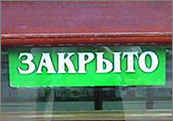| FR | About us | Home | User agreement | Link to us |
Introduction to Adverbs
Adverbs are words used to describe verbs, adjectives or other adverbs. They answer such questions as Как? (How?), Где? (Where?), Когда? (When?), Куда? (Where?), Откуда? (From where?), etc.
Take a look at the example.
| Он говорит | Как? | тихо, быстро |
| Где? | там, здесь | |
| Когда? | сейчас |
Depending on the role that adverbs play in a sentence they can be divided into the following categories:
- Adverbs of place (наречие места)
- Adverbs of time (наречие времени)
- Adverbs of manner (наречие образа действия)
- Adverbs of degree (количественные наречия)
- Predicate adverbs (предикативные наречия)
In Russian, adverbs are usually placed before the verb they modify. However, in many cases the position of an adverb does not impact the meaning of the sentence significantly (see sentence structure). Sometimes you will be on the right track just placing an adverb where you would normally put it in English. Look at the following examples:
Я хорошо плаваю.
(I swim well.)
Он спускается вниз.
(He is going down.)
Она плохо играет на гитаре.
(She plays guitar badly.)
When there are several adverbs in one sentence, adverbs of time come first, followed by adverbs of place and manner:
Завтра нас здесь не будет. (time, place)
(We will not be here tomorrow.)
Сегодня она говорит очень тихо. (time, manner)
(She is speaking very low today.)
Adverbs are very common in spoken language and books. They can be formed from other words, such as adjectives or nouns with prepositions. In addition, there are extremely useful adverbs that are not formed from other words and it makes sense to memorize them.
Useful plain
adverbs
(stressed vowels are
underlined)
| Adverb | Meaning |
| везде | everywhere |
| вместе | together |
| вдруг | suddenly |
| всегда | always |
| (всё) ещё | still |
| ещё | yet |
| затем | then |
| здесь, тут | here |
| иногда | sometimes |
| как | as |
| обычно | usually |
| очень | very |
| потом | afterwards |
| почти | almost |
| совершенно | entirely |
| совсем | quite |
| сразу | immediately |
| так, столько | so |
| также, тоже | also, too |
| там | there |
| тогда | then |
| уже | already |
The good news is that, just like their English counterparts, Russian
adverbs do not change. This means that they do not decline and do not
have number, gender or tense.
Practice exercise
Now that you have some idea of adverbs, it is time for practice. Consult your English-Russian dictionary to find adverbs and make up Russian sentences which would describe how well/often/long/far/in what way you perform the following activities (see possible answers below).
Example:
говорить по-русски (to speak Russian)
Я хорошо говорю по-русски. (I speak Russian well.)1. читать (to read)
2. говорить по телефону (to talk over the telephone)
3. плавать (to swim)
4. смотреть телевизор (to watch TV)
Possible answers for the exercise:
1. Я быстро/медленно читаю.
(I read fast/slowly.)2. Я часто говорю по телефону.
(I talk over the telephone often.)3. Я хорошо плаваю.
(I swim well.)4. Я смотрю телевизор вечером.
(I watch TV in the evening.)
Related Lessons
Got questions?
Ask them in the Russian Questions and Answers — a place for students, teachers and native Russian speakers to discuss Russian grammar, vocabulary, pronunciation, and other aspects of the Russian language.
Copyright 2001-2026 MasterRussian.com | Privacy Policy | Contact Us
 Russian Lessons
Russian Lessons
- Russian alphabet
- Names of letters
- Russian Q&A new
- Pronunciation: Cons.
- Pronunciation: Vowels
- Noun Gender/Number
- Cases of Nouns
- Russian Greetings
- Personal Pronouns
- Learning Russian
- 1000 Common Words
- 500 Russian Verbs
- Top Russian Nouns
- » All lessons
- » Guest lessons
 Browse Topics
Browse Topics
- Start learning Russian
- Forum
- Bookstore
- Dictionaries
- Russian - basic
- Russian - adv
- Pronunciation
- Russian Blog new
- Reading
- Test & quizzes
- Translation
- Verbs
- Verb Conjugations
- Russian numbers
- Russian Tests new
- Vocabulary
- Writing
- Folk music
- Fun stuff
- Leo Tolstoy
- Learner's lore
- Literature
- Personal blogs
- Picture Dictionary new
- Proverbs
- Publications
- Radio & TV
- Russian culture
- Schools in Russia
- Russian Words
- Russian names
- Software
- Russian Words iPhone

Search MasterRussian

English » Russian dictionary

WORD OF THE DAY
![]() RSS
|
iGoogle
|
My Yahoo!
RSS
|
iGoogle
|
My Yahoo!
Meaning: to be able to, can, may
Pronunciation: [mohch']
Learn Russian words more... »
TODAY'S STREET SIGN

Russian: Закрыто
English: Closed
FOLLOW US ON TWITTER

MasterRussian on Twitter


